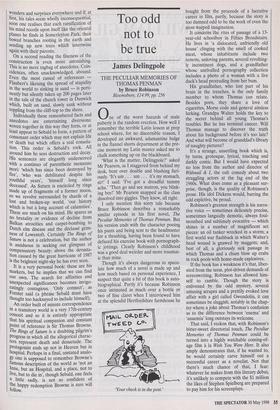Too odd not to be true
James Delingpole
THE PECULIAR MEMORIES OF THOMAS PENMAN by Bruce Robinson Bloomsbury, £14.99, pp. 256 One of the worst hazards of male puberty is the random erection. How well I remember the terrible Latin lesson at prep school where, for no discernible reason, I developed an awkward, adamantine bulge in the flannel shorts department at the pre- cise moment my Latin master asked me to chalk something up on the blackboard.
`What is the matter, Delingpole?' asked Mr Pearson, as I staggered from behind my desk, bent over double and blushing furi- ously. 'It's urn . . . urn . . . it's my stomach, sir!' I said. 'I've got a dreadful tummy ache.' Then go and see matron, you blink- ing boy!' Mr Pearson snapped as the class dissolved into giggles. They knew, all right.
I only mention this sorry tale because Bruce Robinson describes a remarkably similar episode in his first novel, The Peculiar Memories of Thomas Penman. But his version ends with the character pooing his pants and being sent to the headmaster for a thrashing, having been found to have defaced his exercise book with pornograph- ic jottings. Clearly Robinson's childhood was a good deal weirder and more traumat- ic than mine.
Though it's always dangerous to specu- late how much of a novel is made up and how much based on personal experience, I suspect that quite a bit of this book is auto- biographical. Partly it's because Robinson once intimated as much over a bottle or two of fine claret when I interviewed him at the splendid Hertfordshire farmhouse he Tour check is in the post.' bought from the proceeds of a lucrative career in film, partly, because the story is too damned odd to be the work of even the most warped imagination.
It concerns the rites of passage of a 13- year-old schoolboy in Fifties Broadstairs. He lives in 'a dislocated, unfriendly old house' clinging with the smell of cooked meat, whose inhabitants include two remote, unloving parents, several revolting- ly incontinent dogs, and a grandfather whose unrivalled pornography collection includes a photo of a woman with a live duck's head protruding from her bum.
His grandfather, who lost part of his brain in the trenches, is the only family member to whom Thomas can relate. Besides porn, they share a love of cigarettes, Morse code and general aimless lurking. Grandpa Walter holds the key to the secret behind all young Thomas's troubles. But he has terminal cancer. Will Thomas manage to discover the truth about his background before it's too late? And what will become of granddad's library of naughty pictures?
It's a strange, unsettling book which is, by turns, grotesque, lyrical, touching and darkly comic. But I would have expected no less from the author and director of Withnail & I, the cult comedy about two struggling actors at the fag end of the 1960s. What does come as a pleasant sur- prise, though, is the quality of Robinson's prose. His idol Dickens would, barring the odd expletive, be proud.
Robinson's greatest strength is his narra- tive voice — sometimes delicately precise, sometimes languidly demotic, always foul- mouthed and sublimely evocative — which shines in a number of magnificent set pieces: an oil tanker wrecked in a storm; a first world war flashback in which Walter's head wound is gnawed by maggots; and, best of all, a gloriously sick passage in which Thomas and a chum blow up crabs in rock pools with home-made explosives.
If the book has a weakness it's that, liber- ated from the terse, plot-driven demands of screenwriting, Robinson has allowed him- self to ramble. Though the story is enlivened by the odd mystery, several amusing scrapes and a prettily evoked love affair with a girl called Gwendolin, it can sometimes be sluggish, notably in the chap- ter where a joke about Thomas's confusion as to the difference between 'enema' and `anaemia' long outstays its welcome.
That said, I reckon that, with Robinson's bitter-sweet directorial touch, The Peculiar Memories of Thomas Penman could be turned into a highly watchable coming-of- age film a la Wish You Were Here. It also amply demonstrates that, if he wanted to, he would certainly carve himself out a successful career as a novelist. Not that there's much chance of that, I fear: whatever he makes from this literary debut, it's unlikely to compete with the $1 million the likes of Stephen Spielberg are prepared to pay him for his screenplays.


































































 Previous page
Previous page